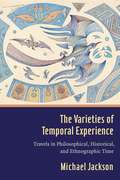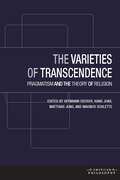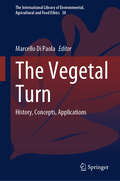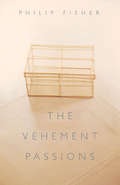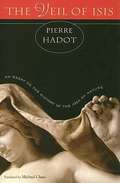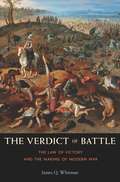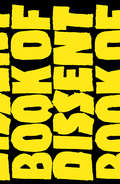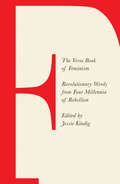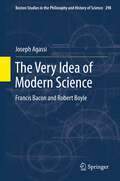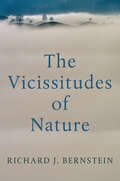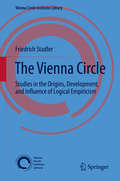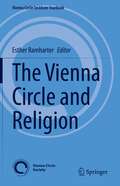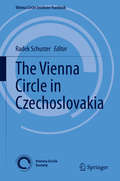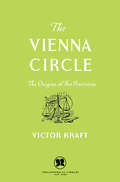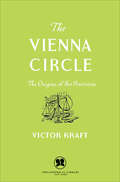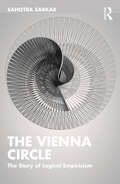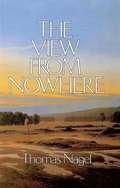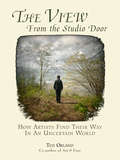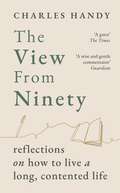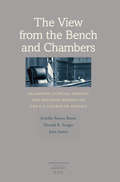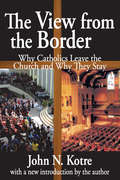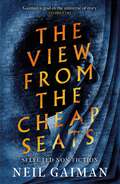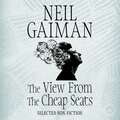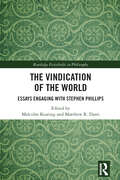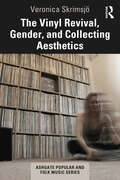- Table View
- List View
The Varieties of Temporal Experience: Travels in Philosophical, Historical, and Ethnographic Time
by Professor Michael D. JacksonWhat does it mean to live in time, between the unforeseeable and the irreversible? In The Varieties of Temporal Experience, Michael Jackson demonstrates the significance of a phenomenology of time for ethnography, philosophy, and history through a multifaceted consideration of the gap between our cultural representations of temporality and the bewildering multiplicity of our experience of being-in-time.Jackson explores temporality in a subjective mode as a form of literary anthropology. The first part of the book tells the story of John Joseph Pawelka, whose 1910 escape from prison and subsequent disappearance became one of New Zealand’s great unsolved mysteries, discussing what it reveals about the interplay of popular stories, hidden histories, and media narratives in constructing allegories of national and moral identity. In the second, Jackson reflects on journeys up and down the islands of New Zealand, touching on the ways that personal stories are interwoven with social and historical events. Throughout this groundbreaking book, Jackson juxtaposes philosophy, history, and ethnography in an attempt to do justice to the extraordinary variety of temporal experience, at the same time exploring the ethical and existential quandaries that arise from the complexity of lived time.
The Varieties of Transcendence: Pragmatism and the Theory of Religion (American Philosophy)
by Hans Joas Matthias Jung Magnus SchletteThe Varieties of Transcendence traces American pragmatist thought on religion and its relevance for theorizing religion today. The volume establishes pragmatist concepts of religious individualization as powerful alternatives to the more common secularization discourse. In stressing the importance of Josiah Royce’s work, it emphasizes religious individualism’s compatibility with community. At the same time, by covering all of the major classical pragmatist theories of religion, it shows their kinship and common focus on the interrelation between the challenges of contingency and the semiotic significance of transcendence.
The Vegetal Turn: History, Concepts, Applications (The International Library of Environmental, Agricultural and Food Ethics #38)
by Marcello Di PaolaThis book charts the multidimensional course of what has come to be known as the “Vegetal Turn” in environmental humanities - a wave of theoretical and practical interest in the complexities and peculiarities of plant life and plant-human relations. The vegetal turn consists of increasingly sophisticated, inter- and trans-disciplinary, inter- and trans-cultural explorations of the multiple systems and networks of communication, intelligence, technical-operational capabilities, and relations articulated by and via plants - as well as the ethical, economic, cultural, and political dimensions of plant-human interactions and practices. The volume includes contributions from philosophy and the humanities more generally that explore and reflect on the history, prospects, and applications of four main themes that the Vegetal Turn has brought to general attention: the mind of plants, and what their peculiar mentality can tell us about mind more generally; plant personhood and/or moral standing, and the justifications and implications of attributions thereof; plant relationships with humans, plant-based human relationships, and the ethics of human practices with or regarding plants - from agriculture to the arts, from forest management to urban design ; as well as the rights and/or political representation of plant life and the other life-forms that depend on it, human as well as non-human, present and future.
The Vehement Passions
by Philip FisherBreaking off the ordinary flow of experience, the passions create a state of exception. In their suddenness and intensity, they map a personal world, fix and qualify our attention, and impel our actions. Outraged anger drives us to write laws that will later be enforced by impersonal justice. Intense grief at the death of someone in our life discloses the contours of that life to us. Wonder spurs scientific inquiry. The strong current of Western thought that idealizes a dispassionate world has ostracized the passions as quaint, even dangerous. Intense states have come to be seen as symptoms of pathology. A fondness for irony along with our civic ideal of tolerance lead us to prefer the diluted emotional life of feelings and moods. Demonstrating enormous intellectual originality and generosity, Philip Fisher meditates on whether this victory is permanent-and how it might diminish us. From Aristotle to Hume to contemporary biology, Fisher finds evidence that the passions have defined a core of human nature no less important than reason or desire. Traversing the Iliad, King Lear, Moby Dick, and other great works, he discerns the properties of the high-spirited states we call the passions. Are vehement states compatible with a culture that values private, selectively shared experiences? How do passions differ from emotions? Does anger have an opposite? Do the passions give scale, shape, and significance to our experience of time? Is a person incapable of anger more dangerous than someone who is irascible? In reintroducing us to our own vehemence, Fisher reminds us that it is only through our strongest passions that we feel the contours of injustice, mortality, loss, and knowledge. It is only through our personal worlds that we can know the world.
The Veil of Isis: An Essay on the History of the Idea of Nature
by Michael Chase Pierre HadotNearly 25 hundred years ago the Greek thinker Heraclitus supposedly uttered the cryptic wprds 'Phusis kruptesthai philei'. How the aphorism, usually translated as 'nature loves to hide', has haunted Western culture ever since is the subject of this engaging study by Pierre Hadot.
The Verdict of Battle: The Law Of Victory And The Making Of Modern War
by James Q. WhitmanToday, war is considered a last resort for resolving disagreements. But a day of staged slaughter on the battlefield was once seen as a legitimate means of settling political disputes. James Whitman argues that pitched battle was essentially a trial with a lawful verdict. And when this contained form of battle ceased to exist, the law of victory gave way to the rule of unbridled force. The Verdict of Battle explains why the ritualized violence of the past was more effective than modern warfare in bringing carnage to an end, and why humanitarian laws that cling to a notion of war as evil have led to longer, more barbaric conflicts. Belief that sovereigns could, by rights, wage war for profit made the eighteenth century battle’s golden age. A pitched battle was understood as a kind of legal proceeding in which both sides agreed to be bound by the result. To the victor went the spoils, including the fate of kingdoms. But with the nineteenth-century decline of monarchical legitimacy and the rise of republican sentiment, the public no longer accepted the verdict of pitched battles. Ideology rather than politics became war’s just cause. And because modern humanitarian law provided no means for declaring a victor or dispensing spoils at the end of battle, the violence of war dragged on. The most dangerous wars, Whitman asserts in this iconoclastic tour de force, are the lawless wars we wage today to remake the world in the name of higher moral imperatives.
The Verso Book of Dissent: Revolutionary Words from Three Millennia of Rebellion and Resistance
by Tariq Ali Audrea Lim Andrew HsiaoThroughout the ages and across every continent, people have struggled against those in power and raised their voices in protest--rallying others around them and inspiring uprisings in eras yet to come. Their echoes reverberate from Ancient Greece, China and Egypt, via the dissident poets and philosophers of Islam and Judaism, through to the Arab slave revolts and anti-Ottoman rebellions of the Middle Ages. These sources were tapped during the Dutch and English revolutions at the outset of the Modern world, and in turn flowed into the French, Haitian, American, Russian and Chinese revolutions. More recently, resistance to war and economic oppression has flared up on battlefields and in public spaces from Beijing and Baghdad to Caracas and Los Angeles.This anthology, global in scope, presents voices of dissent from every era of human history: speeches and pamphlets, poems and songs, plays and manifestos. Every age has its iconoclasts, and yet the greatest among them build on the words and actions of their forerunners. The Verso Book of Dissent will become an invaluable resource, reminding today's citizens that these traditions will never die.
The Verso Book of Feminism: Revolutionary Words from Four Millennia of Rebellion
by Rosie Warren Jessie Kindig Sophia Giovannitti Charlotte HeltaiAn unprecedented collection of feminist voices from four millennia of global historyThroughout written history and across the world, women have protested the restrictions of gender and the limitations placed on women's bodies and women's lives. People–of any and no gender–have protested and theorized, penned manifestos and written poetry and songs, testified and lobbied, gone on strike and fomented revolution, quietly demanded that there is an "I" and loudly proclaimed that there is a "we." The Book of Feminism chronicles this history of defiance and tracks it around the world as it develops into a multivocal and unabashed force.Global in scope, The Book of Feminism shows the breadth of feminist protest and of feminist thinking, moving through the female poets of China's Tang Dynasty and accounts of indigenous women in the Caribbean resisting Columbus's expedition, British suffragists militating for the vote and the revolutionary petroleuses of the 1848 Paris Commune, the first century Trung sisters who fought for the independence of Nam Viet to women in 1980s Botswana fighting for equal protection under the law, from the erotica of the 6th century and the 19th century to radical queer politics in the 20th and 21st.The Book of Feminism is a weapon, a force, a lyrical cry, and an ongoing threat to misogyny everywhere.
The Very Idea of Modern Science
by Joseph AgassiThis book is a study of the scientific revolution as a movement of amateur science. It describes the ideology of the amateur scientific societies as the philosophy of the Enlightenment Movement and their social structure and the way they made modern science such a magnificent institution. It also shows what was missing in the scientific organization of science and why it gave way to professional science in stages. In particular the book studies the contributions of Sir Francis Bacon and of the Hon. Robert Boyle to the rise of modern science. The philosophy of induction is notoriously problematic, yet its great asset is that it expressed the view of the Enlightenment Movement about science. This explains the ambivalence that we still exhibit towards Sir Francis Bacon whose radicalism and vision of pure and applied science still a major aspect of the fabric of society. Finally, the book discusses Boyle's philosophy, his agreement with and dissent from Bacon and the way he single-handedly trained a crowd of poorly educated English aristocrats and rendered them into an army of able amateur researchers.
The Vicissitudes of Nature: From Spinoza to Freud
by Richard J. BernsteinThe relation between humans and nature is at the core of the great existential threats of our time, from climate change, extreme weather, and environmental destruction to devastating pandemics. We are becoming increasingly aware of the fact that, unless we change our behavior radically and quickly, the most likely outcome will be the destruction of countless species and forms of life, including our own. But we also need to change the way we think about nature, and think about the relation between humans and nature – this is a key intellectual task. In this important book, Richard J. Bernstein argues that an adequate conception of humans and nature, capable of facing up to the existential threats of our time, requires taking full account of the major projects dealing with nature in the past. Focusing on key figures of modernity – Spinoza, Hume, Kant, Hegel, Marx, Nietzsche, and Freud – Bernstein reconstructs their conceptions of nature and uncovers the reasons that led them to their distinctive views. Working through the contradictions and incompatibilities among these diverse thinkers, Bernstein identifies common themes that have shaped their struggles in dealing with the relation of humans to nature. He offers a critical overview of the challenges illuminated by each perspective that must be confronted in our thinking of nature today. As a prolegomenon to rethinking humanity and nature, this book uncovers the rich conceptual resources available within the modern tradition that can help us to develop an adequate understanding of nature for our time.
The Vienna Circle
by Friedrich StadlerThis abridged and revised edition of the original book (Springer-Wien-New York: 2001) offers the only comprehensive history and documentation of the Vienna Circle based on new sources with an innovative historiographical approach to the study of science. With reference to previously unpublished archival material and more recent literature, it refutes a number of widespread clichés about "neo-positivism" or "logical positivism". Following some insights on the relation between the history of science and the philosophy of science, the book offers an accessible introduction to the complex subject of "the rise of scientific philosophy" in its socio-cultural background and European philosophical networks till the forced migration in the Anglo-Saxon world. The first part of the book focuses on the origins of Logical Empiricism before World War I and the development of the Vienna Circle in "Red Vienna" (with the "Verein Ernst Mach"), its fate during Austro-Fascism (Schlick's murder 1936) and its final expulsion by National-Socialism beginning with the "Anschluß" in 1938. It analyses the dynamics of the Schlick-Circle in the intellectual context of "late enlightenment" including the minutes of the meetings from 1930 on for the first time published and presents an extensive description of the meetings and international Unity of Science conferences between 1929 and 1941. The chapters introduce the leading philosophers of the Schlick Circle (e. g. , Hans Hahn, Otto Neurath, Rudolf Carnap, Philipp Frank, Felix Kaufmann, Edgar Zilsel) and describe the conflicting interaction between Moritz Schlick and Otto Neurath, the long term communication between Moritz Schlick, Friedrich Waismann and Ludwig Wittgenstein, as well as between the Vienna Circle with Heinrich Gomperz and Karl Popper. In addition, Karl Menger's "Mathematical Colloquium" with Kurt Gödel is presented as a parallel movement. The final chapter of this section describes the demise of the Vienna Circle and the forced exodus of scientists and intellectuals from Austria. The second part of the book includes a bio-bibliographical documentation of the Vienna Circle members and for the first time of the assassination of Moritz Schlick in 1936, followed by an appendix comprising an extensive list of sources and literature.
The Vienna Circle and Religion (Vienna Circle Institute Yearbook #25)
by Esther RamharterThis book is the first systematic and historical account of the Vienna Circle that deals with the relation of logical empiricists with religion as well as theology. Given the standard image of the Vienna Circle as a strong anti-metaphysical group and non-religious philosophical and intellectual movement, this book draws a surprising conclusion, namely, that several members of the famous Moritz Schlick-Circle - e.g., the left wing with Rudolf Carnap, Otto Neurath, Philipp Frank, Edgar Zilsel, but also Schlick himself - dealt with the dualisms of faith/ belief and knowledge, religion and science despite, or because of their non-cognitivist commitment to the values of Enlightenment. One remarkable exception was the philosopher and Rabbi Joseph Schächter, who wrote explicitly on religion and philosophy after the linguistic turn. The book also covers another puzzling figure: the famous logician Kurt Gödel, who wrote on theology and the ontological proof of God in his so far unpublished notebooks. The book opens up new perspectives on the Vienna Circle with its internal philosophical and political pluralism and is of value to philosophers, historians and anybody who is interested in the relation between science and religion.
The Vienna Circle in Czechoslovakia (Vienna Circle Institute Yearbook #23)
by Radek SchusterThis book explores the remarkable interconnections of the Czechoslovak environment and the work and legacy of the Vienna Circle on the philosophical, scientific and artistic level. The Czech lands and later Czechoslovakia were the living and working space for the predecessors and catalysts for Logical Empiricism, such as Bernard Bolzano, Ernst Mach and Albert Einstein, along with key figures in the Vienna Circle such as Philipp Frank and Rudolf Carnap. Moreover, Prague hosted important academic events in which Logical Empiricism was presented to the public, such as the September 1929 1st Conference on the Epistemology of the Exact Sciences, which launched the key manifesto, The Vienna Circle. The Scientific Conception of the World. In addition, this book investigates both the positive and negative receptions of Logical Empiricism within Czech and Slovak intellectual circles. The volume features a selection of contributions to the international conference, The Vienna Circle in Czechoslovakia, held in Pilsen, Czech Republic, in February 2015. These essays are supplemented by two texts of vivid personal memoirs by Nina Holton and Ladislav Tondl. The book is of interest to scholars and researchers interested in the history of philosophy and science in central Europe and the philosophy of science and the Logical Empiricism of the Vienna Circle.
The Vienna Circle: The Origins of Neo-Positivism
by Victor KraftJoin original Vienna Circle member Victor Kraft in his discussion of the movement for an exclusive insider&’s view of this important point in philosophical history. In this in-depth philosophical study, Victor Kraft explores the role the Vienna Circle had on the international philosophical movement. The Vienna Circle constituted a point of departure for the reawaking, rebirth, and reformation of positivism and empiricism, leading to the creation of the Neo-positivism movement. At the time of The Vienna Circle&’s publication in the 1950s, the Neo-positivism movement stood in the foreground of contemporary philosophy, and it was quite possibly the most significant serious philosophical movement in the period between the two world wars. Making Kraft&’s study of Neo-positivism available to a world audience, Arthur Pap provides a rich and accessible translation from the original German. The book contains detailed expositions, accompanied here and there by criticism, of the Vienna Circle&’s views on the criteria of significance, the nature of logic and mathematics, the phenomenalist analysis of physical concepts, the verification-basis of scientific propositions, the meaning of probability, physicalism, and much more.
The Vienna Circle: The Origins of Neo-Positivism
by Victor KraftA member of the elite group who helped forge the logical positivism movement delves into the intellectual world of early-twentieth-century Vienna. Drawing together some of the greatest minds in Europe during the 1920s and 30s, the Vienna Circle had a profound influence on contemporary science and philosophy. Thinkers such as Moritz Schlick, Gustav Bergmann, and Karl Menger met regularly at the University of Vienna to discuss the philosophy of science, taking inspiration from such pioneering works as Ludwig Wittgenstein&’s Tractatus Logico-Philosophicus and Alfred North Whitehead and Bertrand Russell&’s Principia Mathematica. In this in-depth study, Vienna Circle member Victor Kraft explores this group&’s role in the development of modern thought. The Vienna Circle constituted a point of departure for the rebirth and reformation of positivism and empiricism, leading to the creation of the Neo-positivism movement. At the time of publication in the 1950s, the neopositivism movement stood in the foreground of contemporary philosophy, and it was quite possibly the most significant philosophical movement between the two world wars. Making Kraft&’s study of neopositivism available to a world audience, Arthur Pap provides a rich and accessible translation from the original German publication.</
The Vienna Circle: The Story of Logical Empiricism
by Sahotra SarkarIn Vienna in the 1920s a group of brilliant philosophers, mathematicians, and scientists – led by figures such as Moritz Schlick, Otto Neurath, Rudolf Carnap, and Hans Hahn – gathered to discuss the foundations of science and mathematics. Known as the Vienna Circle, they proposed to practice philosophy in continuity with science; their movement became known as Logical Empiricism.In this highly engaging book, Sahotra Sarkar tells the story of one hundred years of Logical Empiricism, from its beginnings in 1924 to its legacy today. He explains how its ideas, influenced by revolutionary theories of space, time, and causality of that time, led to a quest for a unified theory of science. He shows how their commitment to logic and objectivity provided a powerful political antidote to Nazi racism and obscurantism. He charts the decline of the movement after many members, who had fled to the United States during World War Two, were presumed to have communist sympathies and subjected to surveillance and harrassment. He argues that the ideas of the movement continue to be relevant today.A superb evocation of one of the most important intellectual movements of the twentieth century, The Vienna Circle: The Story of Logical Empiricism will be of great value to anyone interested in philosophy, history, and the history of science.
The View From Nowhere
by Thomas NagelHuman beings have the unique ability to view the world in a detached way: We can think about the world in terms that transcend our own experience or interest, and consider the world from a vantage point that is, in Nagel's words, "nowhere in particular". At the same time, each of us is aparticular person in a particular place, each with his own "personal" view of the world, a view that we can recognize as just one aspect of the whole. How do we reconcile these two standpoints--intellectually, morally, and practically? To what extent are they irreconcilable and to what extent canthey be integrated? Thomas Nagel's ambitious and lively book tackles this fundamental issue, arguing that our divided nature is the root of a whole range of philosophical problems, touching, as it does, every aspect of human life. He deals with its manifestations in such fields of philosophy as:the mind-body problem, personal identity, knowledge and skepticism, thought and reality, free will, ethics, the relation between moral and other values, the meaning of life, and death. Excessive objectification has been a malady of recent analytic philosophy, claims Nagel, it has led to implausibleforms of reductionism in the philosophy of mind and elsewhere. The solution is not to inhibit the objectifying impulse, but to insist that it learn to live alongside the internal perspectives that cannot be either discarded or objectified. Reconciliation between the two standpoints, in the end, isnot always possible.
The View From The Studio Door
by Ted OrlandIn the perennial best-seller Art & Fear, Ted Orland (with David Bayles) examined the obstacles that artists encounter each time they enter their studio and stand before a new blank canvas. Now, in The View From The Studio Door, Orland turns his attention to broader issues that stand to either side of that artistic moment of truth.In a text marked by grace, brevity and humor, Orland argues that when it comes to art making, theory and practice are always intertwined. There are timeless philosophical questions (How do we make sense of the world?) that address the very nature of art making, as well as gritty real-world questions (Is there art after graduation?) that artists encounter the moment they're off the starting blocks and producing work on a regular basis.Simply put, this is a book of practical philosophy. As a teacher and working artist himself, Orland brings authentic insight and encouragement to all those who face the challenge of making art in an uncertain world. The breadth of material covered is reflected in chapters that include Making Sense of the World, Art & Society, The Education of the Artist, Surviving Graduation, Making Art That Matters, The Artistic Community, and more.The View From The Studio Door is the perfect companion piece to Art & Fear, and will appeal to a similar (and already-established) audience of students, working artists, teachers and professionals. For students' benefit, The View is also modestly priced, with wide page margins for easy note-taking and annotation.
The View from Ninety: Reflections on How to Live a Long, Contented Life
by Charles HandyFROM THE BEST SELLING AUTHOR OF THE EMPTY RAINCOAT AND UNDERSTANDING ORGANISATIONS.Over a span of seven decades, Charles Handy was, variously, a businessman, a writer, a philanthropist and a philosopher. Not even a stroke as he approached the age of 90 dimmed his intellectual curiosity or his immense zest for life.In this, his final book, written from the vantage point of a contemplative old age and drawing on his articles for The Idler he shares his thoughts on the big questions with which we all grapple:What things really matter? What daily worries should we learn to treat as unimportant? How do we become more accepting of ourselves and of those around us? How do we discover purpose in our everyday existence? How do we cope with grief and loss?Drawing in part on his own experience, in part on the wisdom of others, he sets out the principles of enjoying a fulfilled and contented life, and gently points the way to the practicalities of achieving it.
The View from the Bench and Chambers: Examining Judicial Process and Decision Making on the U.S. Courts of Appeals (Constitutionalism and Democracy)
by Jennifer Barnes Bowie Donald R. Songer John SzmerFor most of their history, the U. S. courts of appeals have toiled in obscurity, well out of the limelight of political controversy. But as the number of appeals has increased dramatically, while the number of cases heard by the Supreme Court has remained the same, the courts of appeals have become the court of last resort for the vast majority of litigants. This enhanced status has been recognized by important political actors, and as a result, appointments to the courts of appeals have become more and more contentious since the 1990s. This combination of increasing political salience and increasing political controversy has led to the rise of serious empirical studies of the role of the courts of appeals in our legal and political system. At once building on and contributing to this wave of scholarship, The View from the Bench and Chambers melds a series of quantitative analyses of judicial decisions with the perspectives gained from in-depth interviews with the judges and their law clerks. This multifaceted approach yields a level of insight beyond that provided by any previous work on appellate courts in the United States, making The View from the Bench and Chambers the most comprehensive and rich account of the operation of these courts to date.
The View from the Border: Why Catholics Leave the Church and Why They Stay
by John KotreIn this unique psychological study, John Kotre provides some startling answers to the questions Catholics are now asking about those who abandon the church, those who remain in it, and those who attempt to create a new church within the church. A detailed examination of the borderline between membership and ex-membership in the Catholic Church, as perceived by young adults reared within the Catholic educational system, the book provides an impressive substantive contribution to understanding not only of the modern church, but of organizational change in general.Kotre, himself a product of the Catholic educational system, positions himself amid the tension and ambiguity between those who consider themselves "in" and those who consider themselves "out" of the Catholic Church. He designed a systematic questionnaire covering four hundred variables about each subject's beliefs, values, perceptions of parents, and reasons for being an insider or an outsider. Using this questionnaire he individually interviewed one hundred graduates of Catholic colleges. The surprising results of this important research show that, in spite of sixteen years of formal Catholic education, the attitudes of both the "ins" and the "outs" are not influenced by their Catholic upbringing so much as by their primary group relationships.Recent research has shown that adult Americans are leaving their childhood faiths at ever increasing rates and that the Catholic Church is suffering the greatest losses. Kotre's book offers an insightful psychological perspective on this dramatic movement. It is a must-read for professional psychologists and sociologists, theologians, and people interested in the psychology and sociology of religion.
The View from the Cheap Seats: Selected Nonfiction
by Neil GaimanThe View from the Cheap Seats draws together myriad non-fiction writing by international phenomenon and Sunday Times bestselling author Neil Gaiman. From Make Good Art, the speech that went viral, to pieces on artists and legends including Terry Pratchett and Lou Reed, the collection offers a glimpse into the head and heart of one of the most acclaimed writers of our time.'If this book came to you during a despairing night, by dawn, you would believe in ideas and hope and humans again' Caitlin Moran'Literature does not occur in a vacuum. It cannot be a monologue. It has to be a conversation' This collection will draw you in to exchanges on making good art and Syrian refugees, the power of a single word and playing the kazoo with Stephen King, writing about books, comics and the imagination of friends, being sad at the Oscars and telling lies for a living. Here Neil Gaiman opens our minds to the people he admires and the things he believes might just mean something - and welcomes us to the conversation too.
The View from the Cheap Seats: Selected Nonfiction
by Neil GaimanThe View from the Cheap Seats draws together myriad non-fiction writing by international phenomenon and Sunday Times bestselling author Neil Gaiman. From Make Good Art, the speech that went viral, to pieces on artists and legends including Terry Pratchett and Lou Reed, the collection offers a glimpse into the head and heart of one of the most acclaimed writers of our time.'Literature does not occur in a vacuum. It cannot be a monologue. It has to be a conversation'Welcome to the conversation. Neil Gaiman fled the land of journalism to find truths through storytelling and sanctuary in not needing to get all the facts right. Of course, the real world continued to make up its own stories around him, and he has responded over the years with a wealth of ideas and introductions, dreams and speeches. Here 'we can meet the writer full on' (Stephen Fry) as he opens our minds to the people he admires and the things he believes might just mean something - and makes room for us to join the conversation too.(P)2016 HarperCollins Digital
The Vindication of the World: Essays Engaging with Stephen Phillips (Routledge Festschrifts in Philosophy)
by Matthew R. Dasti Malcolm KeatingStephen Phillips has devoted his career to excavating some of the most valuable gems of Indian philosophy and bringing them into conversation with contemporary thought. This volume honors him and follows his lead by continuing his lifelong project: faithfully interpreting Sanskrit texts to think along with their authors about ideas that still perplex us today.It features ten new essays focusing on epistemology, logic, and metaphysics from outstanding philosophers and scholars of Sanskrit philosophy, with contributions varying in methodology: both historical and cross-cultural. Further, in addition to essays on Nyāya and Advaita Vedānta, it engages with Navya-Nyāya (“new Nyāya”), an important but understudied part of Indian philosophy. Through these investigations, in conversation with Phillips's groundbreaking work, the contributors show the value of cross-cultural engagement for philosophical progress.The Vindication of the World will be of interest to scholars and advanced students working in Indian philosophy, comparative philosophy, and, more generally, epistemology, logic, and metaphysics.
The Vinyl Revival, Gender, and Collecting Aesthetics (Ashgate Popular and Folk Music Series)
by Veronica SkrimsjöThe book explores record collecting and vinyl consumption in the 21st century within the context of the vinyl revival. The book highlights gender, and how gender disparity is expressed in vinyl communities.Veronica Skrimsjö considers vinyl consumerism and collecting and how the collector identifies themselves within the socio-political environment of the Global North, with a particular focus on gender. The book includes considerations of Record Store Day, DIY, and DI-together cultures, as well as the historic context needed to evaluate record collecting in the 21st century.The work is aimed at both an academic and a general readership and as such strikes a more informal tone. Personal experiences are emphasised throughout because vinyl consumers are not a homogenous group, and it is only via personal experiences that we can understand the complexity of consumption. The personal experience also helps make the content more relatable, which is crucial as old stereotypes helped distance the collector from the everyday consumer. Readers will benefit from a different perspective on record collecting and consumptions as the book highlights active, creative consumption and provides an in-depth, innovative analysis of how gender inequality is constructed within this context.
